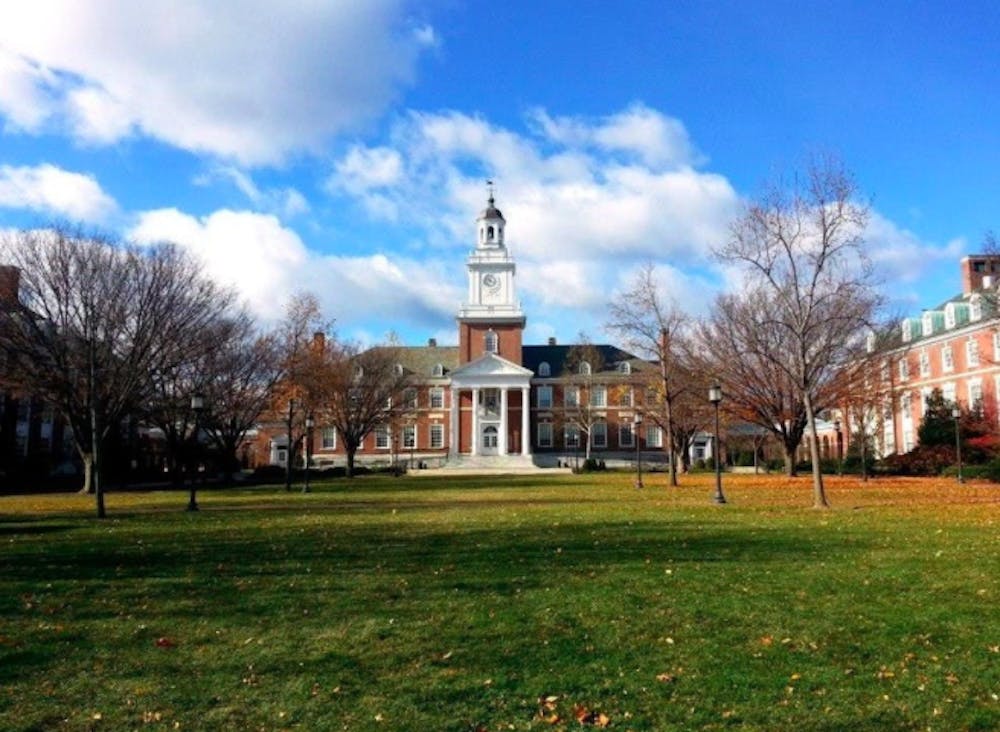The Second Commission on Undergraduate Education (CUE2) held two town halls to discuss its proposed set of recommendations with the student body. The town halls, held over Zoom this past Wednesday and Thursday, were open to the public.
Michael Falk, the vice dean of undergraduate education at the Whiting School of Engineering (WSE), led the discussion.
The commission is using the town halls, as well as feedback forms to hear from students and faculty, to finalize a report outlining its plan to redefine the Hopkins academic program. Falk emphasized that there were also students serving on the commission. He reported that these students were directly involved in all the commission meetings and had a hand in editing the report.
According to Falk, the commission built its report to promote six foundational abilities: language and writing, scientific reasoning, interpreting creative expression, effective engagement as citizens, ethical agency and conceptualization of large-scale projects.
In addition, Falk emphasized increased major flexibility. This will be achieved by limiting major requirements to two-thirds of credit requirements, improving course-based learning assessment and establishing a new system for assessing teacher-student mentoring.
The commission also recommends implementing a “Hopkins Semester,” where juniors and seniors would be able to pursue a mentored immersive study or project such as an internship. The students would receive credit for completion of their project.
Chair of the Jenkins Department of Biophysics at the Krieger School of Arts and Sciences (KSAS) Bertrand García-Moreno discussed the importance of the mission of CUE2.
“This is ultimately about implementing a new model of undergraduate education and will have a huge impact on not just the students that are at Hopkins but for life after Hopkins as well,” García-Moreno said.
As Falk opened the discussion to the public, he noted that the commission’s job was not to defend the recommendations but to take feedback and answer questions.
Charlie Nguyen, a rising senior at KSAS, emphasized the importance of improving diversity and inclusion at Hopkins.
“As a Vietnamese American student having no opportunity to learn about my own history, I think there is an opportunity to hire more diverse staff,” Nguyen said.
García-Moreno agreed, expressing that while it was not explicitly written in the foundational abilities, improving diversity and inclusion was significantly implicit in the commission's plans.
“In moving forwards, we’ll make the space for diversity that is not well represented to find its roots in the curriculum and fit its roots in the activities that students are doing,” García-Moreno said.
Some students had concerns about the logistics of some of the other recommendations.
Filip Aronshtein, a sophomore Electrical Engineering student at WSE, expressed approval of the Hopkins Semester but questioned its feasibility.
“While I think [the Hopkins Semester] is a great opportunity, it’s also scary. There are a lot of fall courses which are prerequisites for spring courses,“ Aronshtein said. “How exactly will the Hopkins Semester be possible for students who need to take two-part courses?”
Falk responded, highlighting that the CUE2 report kept these circumstances in mind.
“It’s hard to imagine how we will implement a Hopkins Semester for our engineering majors if they remain as overstuffed as they are,” Falk said. “The flexibility recommendation would limit the major requirements to 66 percent of total undergraduate credit.”
Lauren Bernard, a KSAS senior, also wondered how university requirements would be implemented for students across different schools. Bernard drew attention to the foundational ability relating to writing and language, questioning how it would be implemented for STEM majors.
García-Moreno explained that introducing writing in a STEM major would not necessarily be teaching scientific writing but rather teaching the students the tools needed to write well.
“If you survey people in all walks of life, and you ask them what’s the one skill that benefits them most or see in spades of people they hire, it often boils down to writing,” García-Moreno said. “It’s not just writing but everything that it comes with.”
According to García-Moreno, maximizing opportunities for student choice was a guiding principle for the commission.
“We’re trying to come up with a structure where you, the student, has agency in how you structure your Hopkins education,“ he said. “You’d be pleasantly surprised when we talk about flexibility of the majors with the chairs of KSAS, how emphatically they make the point that they want to retain the student’s ability to choose what pertains to the students.”
García-Moreno stated that in the first years of implementing the recommendations, the policies will require fine-tuning. According to him, student input will be invaluable in making these revisions.
Nguyen expressed his optimism for the results of the commission.
“I just wanted to thank you all for doing this work,” Nguyen said. “CUE2 is frankly transformative.”





